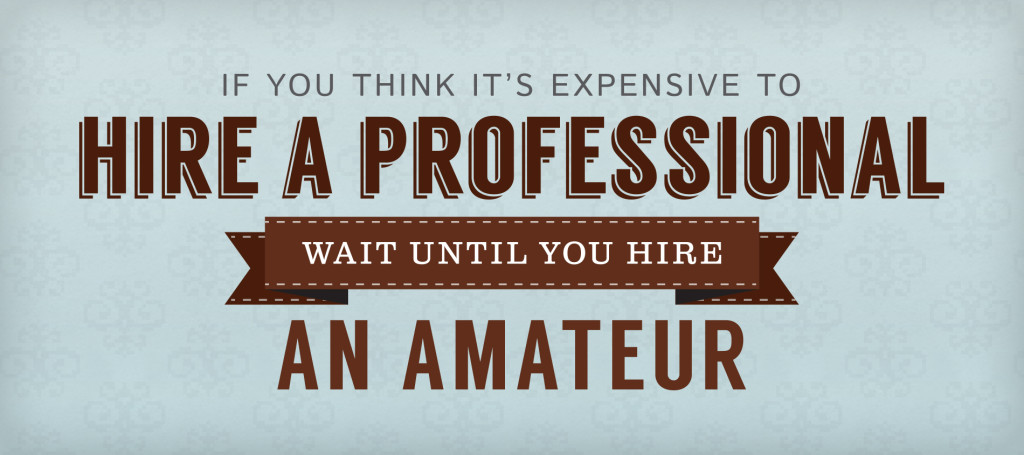“If you think it’s expensive to hire a professional, wait until you hire an amateur.”
Most of us have heard this saying before, but until we experience it for ourselves, we don’t truly understand what it means. I’ll be the first to admit that I’ve had my own experiences with giving in to the temptation of hiring an amateur rather than a professional in order to save a few bucks. I completely understand the thrill of finding a cheap price…and I also understand the disappointment that comes along with sub-standard work. When clients approach me about fixing a botched editing job, I always make sure to let them know that I feel their pain.
My most notable blunder in this arena happened when my husband and I discovered that we had bats in our attic. Despite the terror (and embarrassingly high-pitched screams) the bats induced, we didn’t hire the most highly-recommended pest removal company in our area to eliminate the colony — yes, colony — that lived just inches away from our bed, on the other side of the wall that separated the living space from the attic. Instead, we based our decision largely on price.
In hindsight, it was a dumb move, but we did it because we were under enormous financial pressure at the time. We’d spent a huge chunk of our savings on a down payment to buy the house less than a year earlier. I’d lost my job only weeks before discovering the bats, and things were also rocky with my husband’s job. Even with the bargain-priced pest removal, our insurance only covered about half of the cost. Wanting the bats out, but not wanting to dip much further into our savings, we took a gamble. Unfortunately — but not surprisingly — it didn’t pay off. Although the house was bat free for a while, the colony eventually returned because the company didn’t properly patch their entrance to our home. The money we saved led to additional spending (not to mention hassle), and it seems dumb now that we didn’t initially invest in a more reputable pest removal company.
I’ve worked with a number of clients who have been through the editing version of the bargain-basement bat removal. Like me, they hired the amateur instead of the pro because of the attractive pricing. These clients are always grateful to find me, and they’re always mildly ashamed of the route they took to get to me. (They shouldn’t be. We’ve all done it, whether with bats or editing or some other decision we should have approached with more caution.)
This winter, a client hired me to proofread the last 75% of her novel manuscript when she lost her first proofreader after three or four chapters had already been completed. She didn’t offer the story at first, and I didn’t ask, but I did warn her that the results would be better if I proofed the whole manuscript. She was concerned about the cost, however, and insisted that the first few chapters were publication-ready because they’d already been proofed by a skilled proofreader. Since my job was only to catch egregious errors (it didn’t matter if I wasn’t able to follow the plot), and since the client provided a style sheet so I could make decisions consistent with the first proofreader’s choices, I agreed to do it. I included a disclaimer in the contract saying that I assumed no responsibility for the quality of the first 25% of the manuscript and that I assumed no responsibility for inconsistencies between the first 25% and the last 75%. In order to save money by not having me proofread the first few chapters of her novel, the client agreed to these terms.
I finished the job, and within a few days she asked if I’d proof the first 25%, too. “You caught a lot more errors than the last proofreader,” she said. “I doubt the manuscript was that much cleaner in the early chapters. Can you maybe…?”
Yes. And thank goodness. There was a lot that had slipped past that first proofreader, some of it minor and some not. “Jimi Hendrix” and several other names were spelled incorrectly, “OK” and “okay” were both used in the text even though the style sheet specified “okay,” there was sometimes an extra space after end punctuation, and numerous additional errors that should have been caught.
When I returned the proofed chapters, that’s when the client confessed. She had tried to save money by hiring someone from her writers’ group at rates that were not that much lower than mine. The proofreader from writers’ group bowed out upon realizing how many hours the project would take, saying that she wouldn’t be able to complete it by the client’s deadline. The proofreader from writers’ group had just enough knowledge to pass herself off as a professional (much like the pest control company I hired to get rid of the bats!), but she wasn’t able to deliver the goods.
My client, a single mom who was rightfully cost-conscious because she had children to feed and bills to pay, spent an extra $350 on proofreading her novel because she didn’t hire a professional right away. She had enough pride in her book that she wanted to send it out into the world as polished as possible, so she did the right thing in the end, but it was painful for her to realize that her cost-cutting measure increased the price.
Professional editing is expensive, there’s no denying that. (A few posts back, I explained why.) The thing is, amateur editing is expensive too — often more expensive. Save yourself some money (and time, and grief) by hiring the pro right away. I wish I had been smart enough to do that the first time a bat made its way out of the attic and into my adjoining bedroom…
